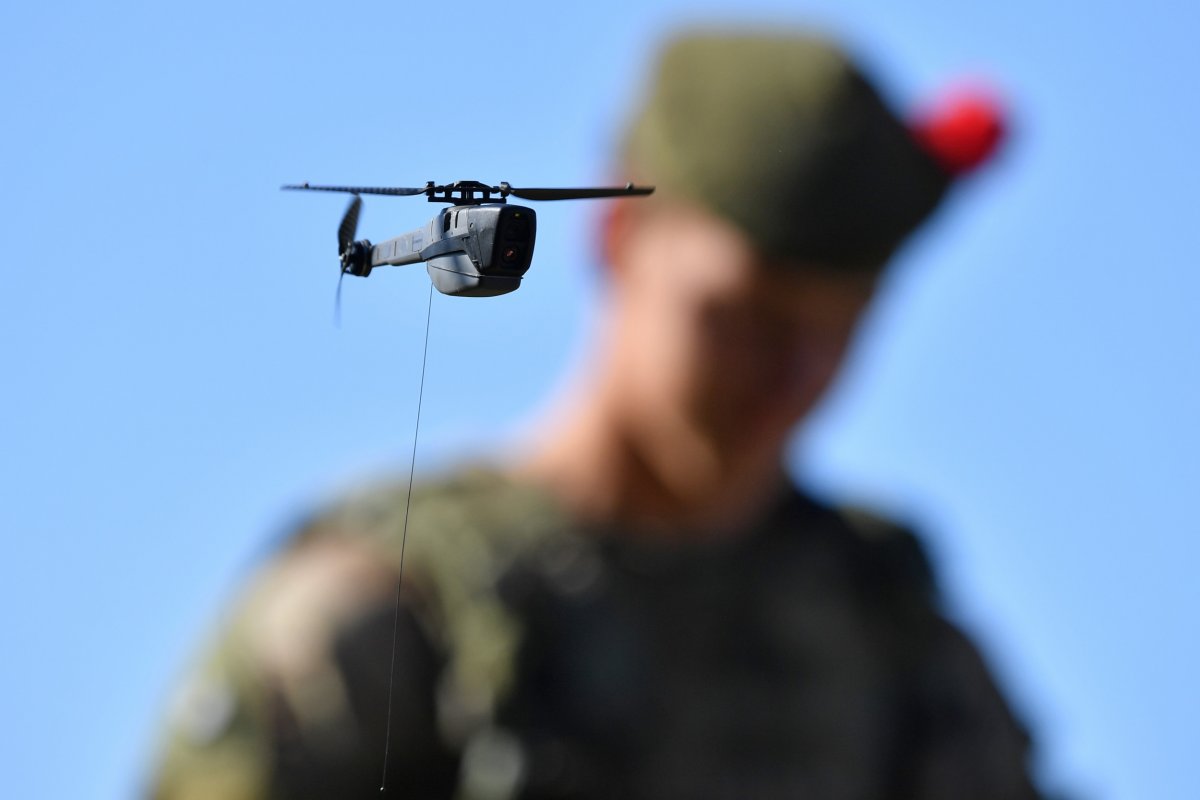British Prime Minister Boris Johnson announced Wednesday during a surprise visit to Ukraine that 850 Black Hornet micro-drones, which can easily fit into the palm of a human hand, would be given to the country as it continues to fight the Russian invasion.
Designed for scouting and spying, the micro-drones are particularly useful for urban combat where they can check which buildings enemies are in before soldiers advance.
The drones are being gifted as part of a joint U.K.-Norway program, with Norway contributing $9 million, according to Defense News.
Black Hornet micro-drones, which resemble a helicopter shrunk to the size of a tennis ball, have a maximum range of about 1.2 miles and can fly for up to 25 minutes, reaching top speeds of 11 miles per hour. They have three high-definition cameras fitted, which can send footage back to a command post, and are fitted with night vision equipment.

The drones are manufactured in Norway by United States-based company Teledyne FLIR. They were originally designed by Norwegian firm Prox Dynamics, which has since been taken over by the American company.
They are designed to be quiet enough to enter buildings without being heard by those inside, making them perfect for reconnaissance. The micro-drones, which at the time cost about £80,000 ($94,274) per unit, were first used by British troops in Afghanistan in 2013.
Speaking to the Daily Mail in 2013, Major Adam Foden said: "Previously we would have sent soldiers forward to see if there were any enemy fighters hiding inside a set of buildings. Now we are deploying Black Hornet to look inside compounds and to clear a route through enemy-held spaces."
David Hambling, author of Swarm Troopers: How small drones will conquer the world, told The Telegraph that Black Hornets have a mixed history.
"The British Army flew them for some years but because they were expensive and fragile (some were allegedly lost because they were trodden on) they were dropped. However, the current generation may be better," Hambling said.
"The big selling point is that it is tiny and quiet, and hence more useful for close-in recon than consumer drones like the DJIs [unnamed commercial drone] widely used by Ukrainian forces which are audible from some distance," he continued. "The Black Hornet is said to be able to enter buildings through open doorways and windows, making it a useful scout in urban combat."
Ukrainian forces have made extensive use of drones, both military and commercial since their country was invaded by Russia in February.
Turkish manufactured Bayraktar TB2 drones have been deployed to strike Russian targets, sometimes significantly behind the frontline, with bombs and missiles.
Speaking to the BBC Haluk and Selçuk Bayraktar, who run the company that manufactures Bayraktar TB2s, said they back Ukraine and won't sell their drones to Russia "no matter how much money we are offered."
Uncommon Knowledge
Newsweek is committed to challenging conventional wisdom and finding connections in the search for common ground.
Newsweek is committed to challenging conventional wisdom and finding connections in the search for common ground.
About the writer
James Bickerton is a Newsweek U.S. News reporter based in London, U.K. His focus is covering U.S. politics and world ... Read more
To read how Newsweek uses AI as a newsroom tool, Click here.






